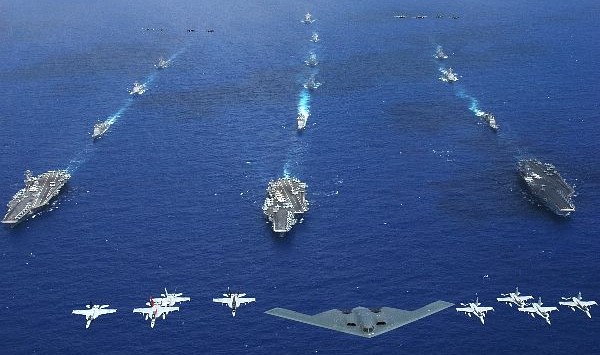Go to the Weekly Report for 13 September 2012
America, time for some self-introspection about AirSea Battle (ASB)/ pivot / rebalance. We never left Asia, but there were clear signs our attention was so focused on Iraq and Afghanistan, sometimes we didn’t even show up to the game in Asia.
Odd.
Given that the Pacific Rim has almost 3 billion people, five of the seven largest armies in the world, the world’s three largest democracies and that we buy $700+billion a year from the Pacific Rim, seems like Asia should have always been important to us.
Our strategy starts with interests: life, liberty, pursuit of happiness or the May 2010 variant: security, prosperity, values, and international order. Then we develop a strategy to pursue our interests. The ‘Whole of Government’ approach means we have several different manifestations of that strategy: diplomatic, economic and military are the more obvious components.
Containment, as an example, used whole of government levers, but was a very specific strategy for a defined threat. U.S. doesn’t “contain” any country anymore; it costs way too much and no other country in the world would join us in a “containment” strategy. It’s ludicrous to think America has the power or will to “contain” any other country. Strategists will recognize the threat = capacity + intention formulation.
Great Powers succeed by working toward achieving their interests within a defined, predictable rule set. Great Powers don’t achieve much if they only focus on frustrating other countries from reaching their goals.
If we assume there is an American Grand Strategy for Asia (and I seriously doubt there is one) the military incarnation should be ASB, but we’ve done such a poor job explaining ASB that everyone is confused. According to the military, “Anti-access/area denial is about systems, it’s about technologies and capabilities. It’s not about a specific actor. It is not about a specific regime.” So every country should be worried, right? Go back to the threat definition. A country needs to display intent to flout the rule set or to take action outside established norms.
North Korea fits both categories. We also find an action/reaction/counteraction cycle which is unhelpful. In the deterrence and proliferation worlds, it’s also a dangerous cycle.
However, ASB should have an economic, diplomatic, etc. analog. If we take Trans-Pacific Partnership as the economic counterpart for ASB, it is possible to bring North Korea into the fold in a very limited way under the Korean Peninsula rubric; maybe as observers or some status acceptable to all sides. If North Korea learns about economics and norm-setting in international behavior, that’s a good thing, right? And at some undefined point in the future, the Korean people will decide to reunify. Having a deeper technocratic bench from which to draw future administrators will pay great dividends.
Reunification will be phenomenally expensive. It’s going to take a lot of capital to get the entire peninsula on a relatively-level field. Finding legitimate rent-seeking opportunities for DPRK, now, is a way to help develop and maintain the infrastructure required to provide basic humanitarian needs.
We should emphasize the most positive manifestations of the rebalance: stability, economic growth, predictable rule-sets while squarely address some of the negative perceptions such as: ludicrous to think we’re containing any country; we’re not aiming at any country, but we are RESPONDING to military technology and hardware choices some countries make. Clarity will help slow the presently-existing dangerous action/reaction/counteraction cycle.
– Roger Cavazos, NAPSNet Contributor
The Nautilus Peace and Security Weekly Report presents articles and full length reports each week in six categories: Austral security, nuclear deterrence, energy security, climate change adaptation, the DPRK, and governance and civil society. Our team of contributors carefully select items that highlight the links between these themes and the three regions in which our offices are found—North America, Northeast Asia, and the Austral-Asia region. Each week, one of our authors also provides a short blog that explores these inter-relationships.



One thought on “DPRK: Clarity – a Spiral Slower”